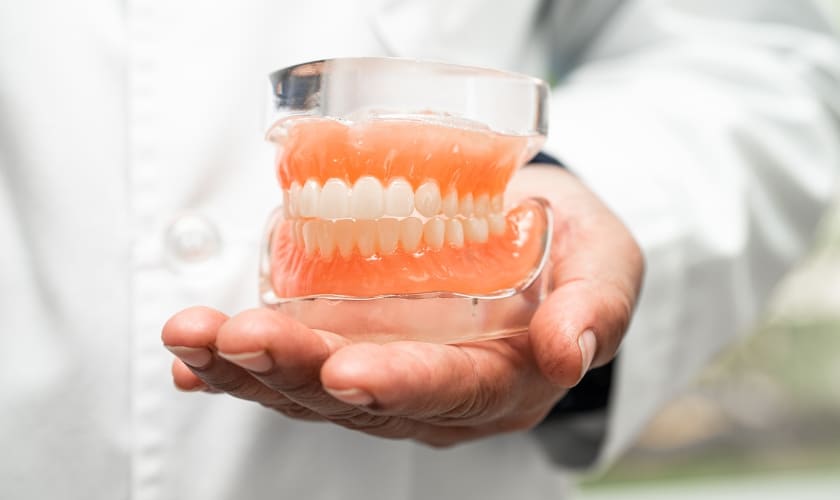Many people experience tooth loss throughout their lives. While it’s a common occurrence, it can significantly impact your ability to chew, speak, and smile with confidence. The good news is that modern dentistry offers effective solutions to restore your smile, and dentures are a popular option for many.
What is Tooth Loss and Its Causes?
Tooth loss can occur due to various reasons, including:
- Gum disease: This is the leading cause of tooth loss in adults. Plaque buildup irritates the gums, leading to inflammation and infection that can damage the jawbone and loosen teeth.
- Decay: Untreated cavities can lead to tooth decay, eventually causing the tooth to break or become infected, requiring extraction.
- Injury: Accidents or trauma to the face can damage or knock out teeth.
- Periodontal disease: This advanced stage of gum disease can severely damage the supporting tissues around the teeth, leading to tooth loss.
- Other health conditions: Certain medical conditions, such as diabetes or osteoporosis, can also contribute to tooth loss.
Types of Tooth Loss
Tooth loss can be categorized into two main types:
- Partial tooth loss: This occurs when you’re missing one or several teeth, but you still have some natural teeth remaining.
- Full tooth loss: This refers to losing all your teeth in either the upper or lower jaw or sometimes both.
What Are Dentures?
Dentures are removable replacements for missing teeth. They are typically made of acrylic resin for the gum base and plastic or porcelain for the teeth. Dentures can restore your ability to chew, speak clearly, and smile confidently. They also help maintain facial structure by preventing sagging of the cheeks and lips.
Are Dentures Right for Me?
Dentures are a viable option for many people with tooth loss. However, it’s important to consult with a dentist to determine if they are the best solution for you. Here are some factors to consider:
- Your overall health: Certain medical conditions may make dentures difficult to wear or care for.
- The condition of your jawbone: Dentures require a healthy jawbone for support. If your jawbone has significantly deteriorated, you might need additional procedures like bone grafting before getting dentures.
- Your preferences and lifestyle: Discuss your expectations and lifestyle with your dentist. They can help you choose the type of dentures that best suit your needs.
Dentures are not the only option for replacing missing teeth. Dental implants are another popular choice that offers a more permanent solution. Your dentist can discuss the pros and cons of each option to help you make an informed decision.
Types of Dentures
There are several types of dentures available, each with its own advantages and disadvantages. Here’s a breakdown of the most common types:
- Full Dentures:
These dentures replace all of your teeth in either the upper or lower jaw or sometimes both. They come in two main varieties:
- Conventional Full Dentures: These are created after your gums have healed following tooth extraction. The healing process typically takes 8-12 weeks. While you wait, you may not have teeth, but this allows the dentist to create dentures that fit your healed gums precisely.
- Immediate Full Dentures: These dentures are made in advance and can be placed immediately after your teeth are extracted. This allows you to avoid being without teeth during the healing period. However, adjustments might be needed as your gums heal and shrink over time.
- Partial Dentures:
Partial dentures are ideal for individuals with some remaining natural teeth. They consist of a metal framework that clasps onto your existing teeth to hold a replacement for the missing teeth. Partial dentures can be made from various materials, including:
- Acrylic: A cost-effective option, but may not be as durable as other materials.
- Metal: Provides a strong and secure fit but might be less aesthetically pleasing.
- Flexible thermoplastics: Comfortable and less noticeable than metal clasps, but may not be suitable for all cases.
- Implant-Supported Dentures:
These dentures combine the stability of dental implants with the removability of traditional dentures. Implants are surgically placed in the jawbone to provide support for the denture. This type of denture offers several benefits, including:
- Improved stability and chewing ability: Implants anchor the denture, preventing slipping and discomfort.
- Preserves jawbone health: Implants stimulate the jawbone, preventing bone loss that can occur with traditional dentures.
- Enhanced confidence: The secure fit allows for worry-free speaking and eating.
Choosing the Right Dentures:
The best type of denture for you depends on your specific needs and preferences. Your dentist will consider factors like the number of teeth missing, the condition of your jawbone, and your budget when recommending the most suitable option.
The Denture Procedure
Getting dentures is a multi-step process that typically takes several weeks to complete. Here’s a breakdown of what you can expect:
- Consultation and Initial Assessment:
- Your dentist will discuss your medical history and dental concerns.
- They will perform a thorough oral examination to assess your jawbone health, remaining teeth (if any), and gum tissue.
- X-rays or other imaging tests might be needed to evaluate your jawbone structure.
- Once the dentist understands your needs, they will discuss the different types of dentures available and recommend the most suitable option for you.
- Taking Impressions and Measurements:
- Accurate impressions of your mouth are crucial for creating well-fitting dentures.
- The dentist will use a special material to create a mold of your upper and lower jaw.
- They will also take measurements of your mouth to determine the size and shape of your dentures.
- Creating the Dentures:
- The impressions and measurements are sent to a dental lab where a skilled technician will create your custom dentures in Oak Forest.
- The dentures are typically made from acrylic resin for the gum base and plastic or porcelain for the teeth.
- Several appointments might be needed during this stage to try in the dentures and make adjustments for proper fit and comfort.
- Fitting and Adjustments:
- Once the dentures are complete, your dentist will insert them and check for fit, comfort, and speech.
- They will make any necessary adjustments to ensure the dentures feel secure and natural.
- You will be given instructions on caring for your dentures and maintaining good oral hygiene.
- Caring for Your New Dentures:
- Proper care is essential for keeping your dentures clean, functional, and lasting longer.
- Your dentist will provide specific cleaning instructions, but generally, you should:
- Brush your dentures daily with a soft-bristled toothbrush and denture cleanser.
- Soak your dentures overnight in a denture cleaning solution.
- Brush your tongue and gums gently to remove plaque and stimulate circulation.
Regular dental checkups are crucial to monitor your oral health and ensure your dentures continue to fit properly.
Living with Dentures
Adjusting to dentures takes time and practice. Here are some tips to help you speak, eat, and smile confidently with your new dentures:
Speaking and Eating with Dentures:
- It may take some practice to get used to speaking clearly with dentures.
- Read aloud to improve your enunciation and practice speaking slowly and deliberately.
- Start with soft foods and gradually introduce harder foods as you get comfortable.
- Chew slowly and on both sides of your mouth to avoid putting too much pressure on one side.
Denture Adhesives:
- Denture adhesives can help improve the fit and stability of your dentures, especially for lower dentures.
- There are different types of adhesives available, including creams, powders, and pads.
- Consult your dentist to choose the most suitable adhesive for your needs and learn how to apply it properly.
Maintaining Oral Health with Dentures:
- Even with dentures, maintaining good oral hygiene is essential.
- Brush your gums and tongue daily to remove plaque and prevent gum disease.
- Remove your dentures at night and soak them in a cleaning solution.
- Schedule regular dental checkups for professional cleanings and to ensure your dentures fit properly.
Potential Problems and Solutions:
- Sore spots: New dentures may cause irritation or soreness. Inform your dentist, and they can adjust the dentures for a better fit.
- Slipping dentures: Denture adhesives can help improve stability. If the problem persists, consult your dentist to check the fit of your dentures.
- Difficulty chewing: Start with soft foods and gradually introduce harder ones. If you continue to experience difficulty, your dentist might need to adjust your dentures.
Remember, these are just some general tips. Your dentist in Oak Forest can provide personalized advice based on your specific situation. Don’t hesitate to reach out to them with any questions or concerns you may have.
Regaining Confidence: The Final Note
This comprehensive guide has equipped you with the knowledge to navigate the world of dentures. From understanding tooth loss and the different types of dentures available to the procedure and aftercare and addressing common concerns, you’re now well-informed to make informed decisions about your oral health.
Remember, dentures are a personal choice, and consulting a certified dentist is crucial. They can assess your specific needs, discuss the most suitable denture option for you, and ensure a successful denture experience. With proper care and guidance from your dentist, dentures can empower you to regain confidence in your smile, improve your ability to chew and speak clearly, and ultimately enhance your overall well-being.
So, take that first step towards a brighter smile. Schedule an appointment with your Oak Forest dentist today and discuss the possibilities dentures can offer!
Frequently Asked Questions
Can I still enjoy my favorite foods with dentures?
Yes, you can enjoy a wide variety of foods with dentures! It may take some practice and adjustment initially. Start with soft foods cut into small pieces and gradually introduce harder textures as you get comfortable. Avoid very sticky or chewy foods that can be difficult to remove from dentures. If you’re unsure about a particular food, consult your dentist for advice.
What happens if my dentures break?
Don’t attempt to fix broken dentures yourself! This can damage them further. Contact your dentist as soon as possible to schedule a repair or replacement.
How often should I see my dentist with dentures?
Regular dental checkups are crucial for denture wearers. Generally, aim for checkups every six months or as recommended by your dentist. These visits allow your dentist to:
- Monitor your oral health and ensure your dentures continue to fit properly.
- Check for signs of gum disease or other oral health problems.
- Perform professional cleanings to remove plaque and tartar buildup.
- Make adjustments or relining of your dentures as needed.

